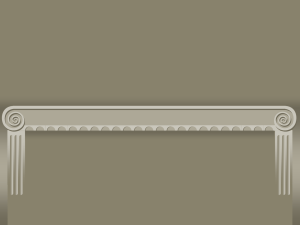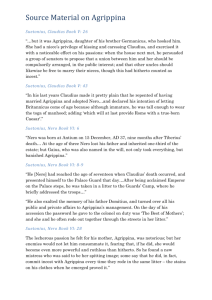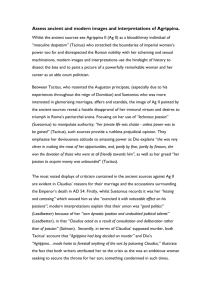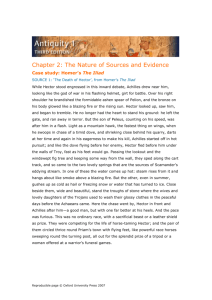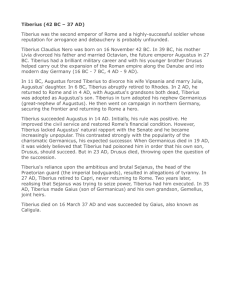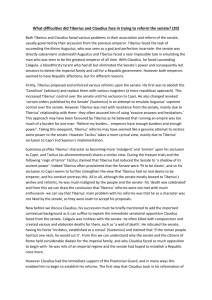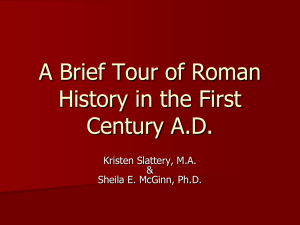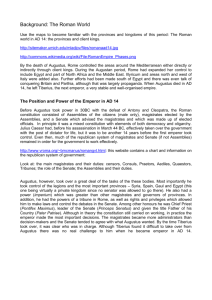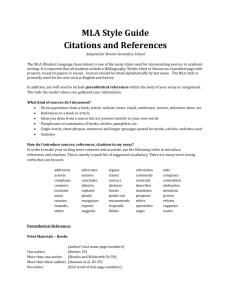Ancient History Source Bank.
advertisement
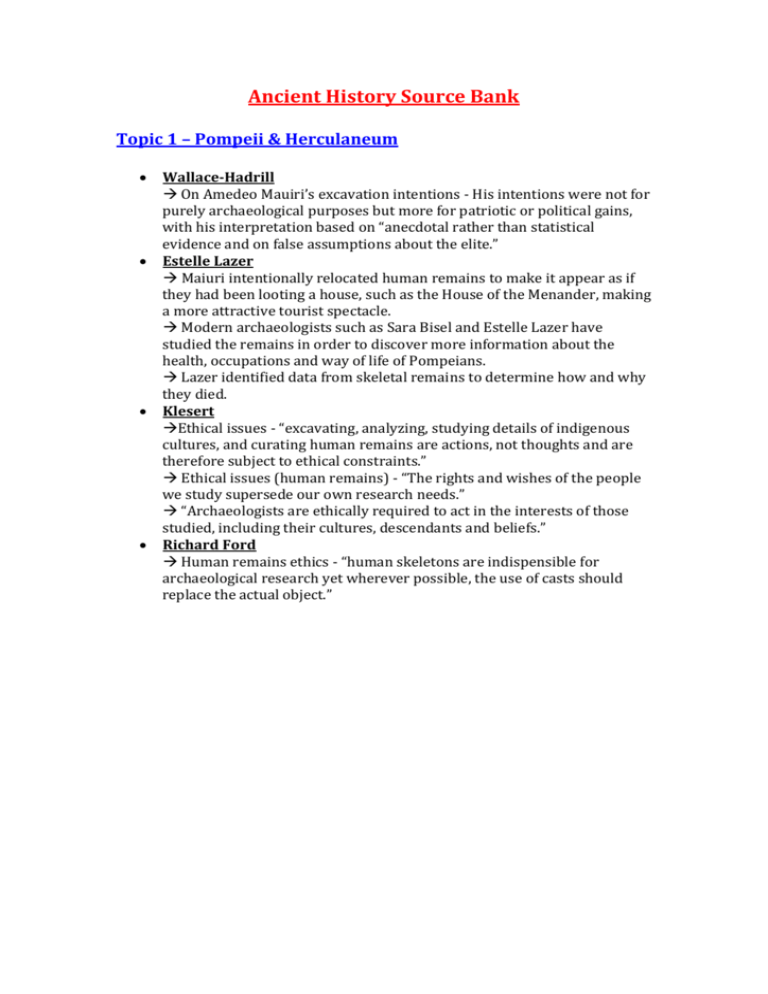
Ancient History Source Bank Topic 1 – Pompeii & Herculaneum Wallace-Hadrill On Amedeo Mauiri’s excavation intentions - His intentions were not for purely archaeological purposes but more for patriotic or political gains, with his interpretation based on “anecdotal rather than statistical evidence and on false assumptions about the elite.” Estelle Lazer Maiuri intentionally relocated human remains to make it appear as if they had been looting a house, such as the House of the Menander, making a more attractive tourist spectacle. Modern archaeologists such as Sara Bisel and Estelle Lazer have studied the remains in order to discover more information about the health, occupations and way of life of Pompeians. Lazer identified data from skeletal remains to determine how and why they died. Klesert Ethical issues - “excavating, analyzing, studying details of indigenous cultures, and curating human remains are actions, not thoughts and are therefore subject to ethical constraints.” Ethical issues (human remains) - “The rights and wishes of the people we study supersede our own research needs.” “Archaeologists are ethically required to act in the interests of those studied, including their cultures, descendants and beliefs.” Richard Ford Human remains ethics - “human skeletons are indispensible for archaeological research yet wherever possible, the use of casts should replace the actual object.” Topic 2 – Sparta Xenophon Lycurgus - “brought his fatherland to this pinnacle of prosperity.” His main embellishment was of the ‘agoge’ system and the influence that Lycurgus had on society. His continuous praise of Sparta comes from him living there for many years, which can lead to heavy bias. Herodotus Spartan army - “fighting together they are the best soldiers in the world.” Aristotle His main criticism stems from the level of rights and freedom that the women of Sparta enjoyed, even going as far as attributing Sparta’s downfall from 371 BC to women owning two-fifths of land. He also believed, as Herodotus did, that the Spartan constitution was fundamentally flawed, as they did not prepare for anything other than war. Constitution/Everyday Life - “for the arts of peace they knew nothing, and had never engaged in any employment other than war.” He provides a very biased and one-sided account, which is shown as he ignores the other attributes of Spartan society. For example, their trade of pottery throughout the Peloponnese (with evidence found in even Switzerland) and their heavy religious beliefs, which demonstrate that they were more than just a wartime society. Plutarch Gives a biography of Lycurgus that can be interpreted with some bias, due to his heavy praise of the man, who he believes “stands in rank of glory high above the founders of all other Greek states.” This is inaccurate though as Lycurgus has not been proven to be the great lawgiver Plutarch describes but it does perpetuate the Lycurgus myth. Thucydides Talks of how he held admiration for Sparta’s internal strength and selfsufficiency and how he admired the Spartan way of life. While he admired their society, he also said how he was glad he did not live there and saw that it was becoming an outdated society where the helot problem revealed their weaknesses. Topic 3 – Agrippina Tacitus Family Background - ”Agrippina’s exceptionally illustrious birth is indisputable.” Marriage to Claudius - ”Agrippina’s seductiveness was a help. Her criminal methods were necessary.” Influence during Reign of Claudius – “From this moment, the country was transformed. Complete obedience was accorded to a woman. This was a rigorous, almost masculine despotism.” Grant Family Background – “She grew up in an appalling atmosphere of malevolence, suspicion and criminal violence.” Role during Early Years of Nero’s Reign – “For a few startling and unprecedented months, the empire was ruled by a woman.” Griffin Marriage to Claudius – “Agrippina had achieved this dominant position for her son and herself by a web of political alliances.” Bauman Influence during Reign of Claudius – “Agrippina used her influence over Claudius not only to consolidate Nero’s claims, but also to enhance her own position.” Agrippina on Coins – “Agrippina appeared in tandem with Nero, sometimes as a goddess complementing Nero’s depiction of a god.” Levick Influence under Claudius – “For Agrippina, the premature advancement of Nero was itself an advertisement of her power.” Scullard Death of Claudius – “Even if she felt that the ultimate succession of her son Nero was secure, she may have wished to see him on the throne while he was still young to follow her advice and will.” Role during Early Years of Nero’s Reign – “Agrippina now meant to rule through her son.” Weidemann Loss of Control over Nero – “Agrippina’s loss of influence is illustrated by the disappearance of her portrait from the coinage.” Salmon Influence of Agrippina – “She was prepared, if necessary, to wade through slaughter to a throne.” Topic 4 – The Julio-Claudians Tiberius Scullard Treason Trials – “Tiberius showed good sense and moderation in the face of growing evil.” Imperial Building Programs – “Tiberius avoided extravagance and was liberal when necessary.” “The only aspects that Tiberius can find to criticize are Tiberius’ ungracious manner and the law of treason.” Tacitus Role and Responsibilities of the Senate – “Tiberius did not feel himself capable of the whole burden of government.” “He was a shadow of the Senate’s ancient power.” Suetonius Roles and Responsibilities of the Senate – “Tiberius showed the Senate respect and consulted it on economic, military and foreign policy.” Imperial Building Programs – “No magnificent public works marked his reign.” Levick Role and Responsibilities of the Senate – “Senate was incapable of acting as a serious deliberative body.” Lissner Development of Imperial Bureaucracy – “His conduct of governmental affairs was characterized by intelligence.” Payne Expansion of Empire – “His reign marked prosperity and generally prevailing peace.” Salmon Expansion of Empire – “Tiberius’ severity became proverbine: justice and efficiency were indeed the twin goals of the reign.” Growth of Imperial Cult and no major building projects marked his reign Gaius Suetonius Role of Senate – “He immediately and unanimously conferred absolute power upon himself.” Imperial Building Programs – “Had wickedly ingenious methods or raising funds.” “Gaius the emperor was replaced by Gaius the monster.” (Downfall) Barrett Role of Senate – “The Senate were reluctant to try and curb or restrain him.” Scullard Expansion of Empire – Gaius was “half-hearted” and “puzzling.” No new building programs merely completed the works of Tiberius Claudius Dio Cassius Imperial Building Programs – he “provided an abundant food supply.” Suetonius Development of the Imperial Bureaucracy – “Claudius fell so deeply under the influence of his freedmen that he appeared to be their servant.” Shotter Development of the Imperial Bureaucracy – “the freedmen of the Princeps became very rich, very influential and bitterly resented.” Levick Role of the Senate – “He inflicted a deep wound in its authority and self-regard.” Salmon Development of the Imperial Bureaucracy – “to obtain administrative efficiency, not to humble the Senate.” Building Programs – Built 2 aqueducts (Aqua Claudia), port at Ostia, roads Expansion of Empire – Invaded Britain and expanded the Empire
